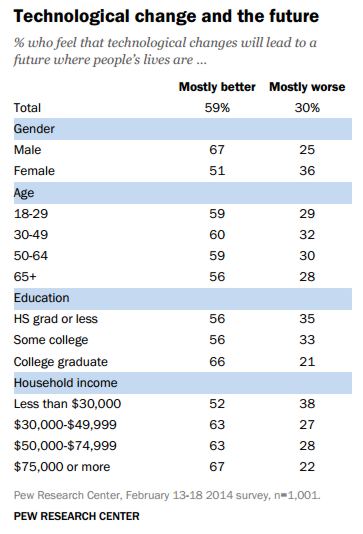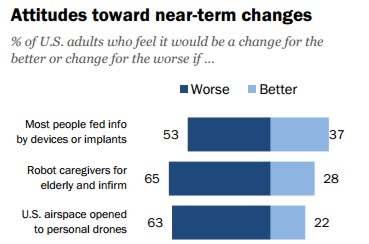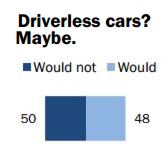| Survey Reveals American Public Suspicious Of Tech |
| Written by Janet Swift |
| Sunday, 20 April 2014 |
|
The American public is split down the middle over whether they would be prepared to ride in a driverless car and whether computers will match humans when it comes to creating works of art. These finding come from a national survey conducted by the Pew Research Center, which asked Americans about a wide range of potential scientific developments—from near-term advances like robotics and bio-engineering, to more "futuristic" possibilities like teleportation or space colonization. While the survey covered many areas from custom organs for transplant and to teleportation and controlling the weather, here we will look at findings related to computers, artificial intelligence and robotics. Americans tend see the technological developments of the coming half-century as having positive impact on society. Overall 59% of the survey of 1000 adults feel that the technological changes will make the future better, while 30% think they will make things worse. There are marked differences between men and women, having a college education of not and having a high, rather than low, level of household income.
Report author, Aaron Smith, notes: Men with a college degree have an especially sunny outlook: 79% of this group expects that technology will have a mostly positive impact on life in the future, while just 14% expect that impact to be mostly negative. However when asked whether computers will match humans when it comes to creating music, novels, paintings, or other important works of art college graduates and those with high incomes are more guarded in their opinion. Whereas 51% of all those survey think that this will happen in the next 50 years, 59% of college graduates feel that computers will not be able to produce works of art that are on par with those produced by humans. Public attitudes matter a great deal when it comes to technological advancement and worryingly from the point of view of those engaged in ubiquitous computing and robotics research, when it comes specific technological advances, those surveyed tended to be negative rather than positive as shown in this graphic:
Smith, comments: With the recent introduction of Google Glass and other wearable computing devices, for example, it may be only a matter of time The fact that almost two-thirds of those surveyed are resistant to the idea of robots as care givers could have an inhibiting effect on research in this area. One change that can be said to have happened already is the driverless car. Overall 48% would like to try this out and 50% say this is something they would not want to do. College graduates are particularly interested in giving driverless cars a try: 59% of them would do so, while 62% of those with a high school diploma or less would not. There is also a geographical split on this issue with urban residents being the most interested (52%) and rural residents the least (36%).
More InformationU.S. Views of Technology and the Future Related ArticlesGoogle Self-Driving Car For Daily Commute Driverless Cars Become Legal - The Implications
To be informed about new articles on I Programmer, install the I Programmer Toolbar, subscribe to the RSS feed, follow us on, Twitter, Facebook, Google+ or Linkedin, or sign up for our weekly newsletter.
Comments
or email your comment to: comments@i-programmer.info
|
| Last Updated ( Sunday, 20 April 2014 ) |




